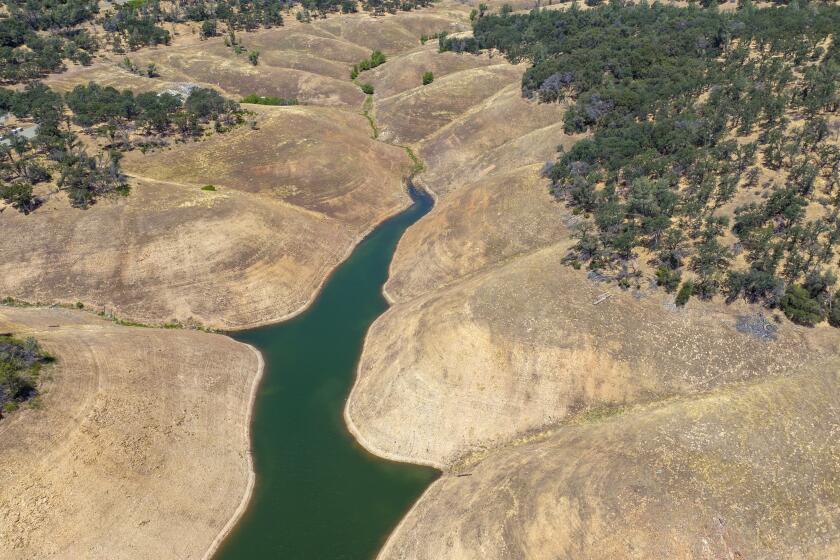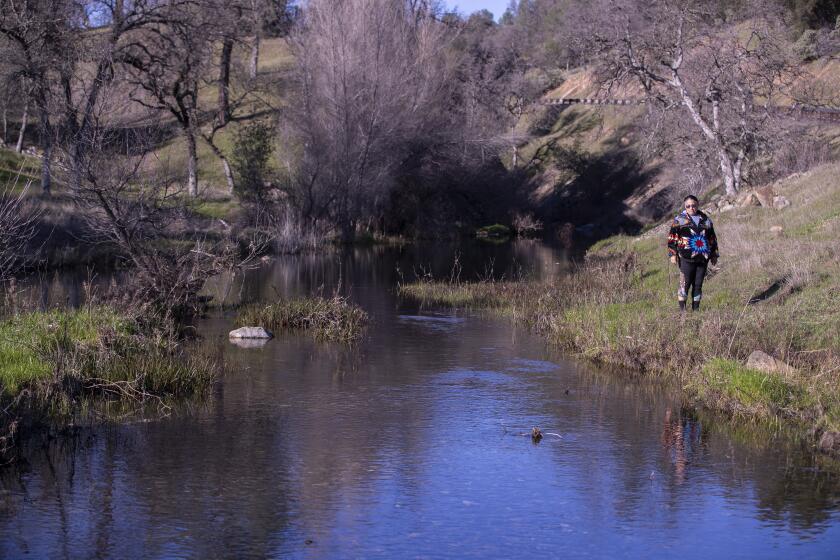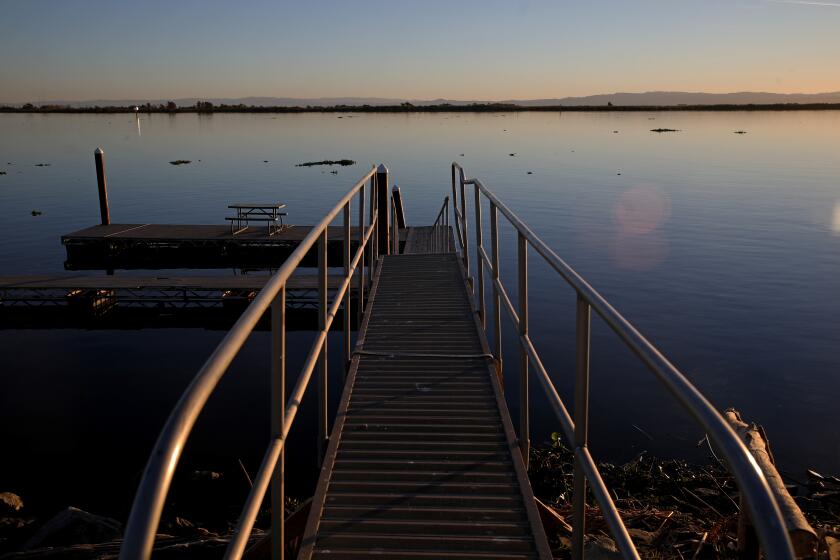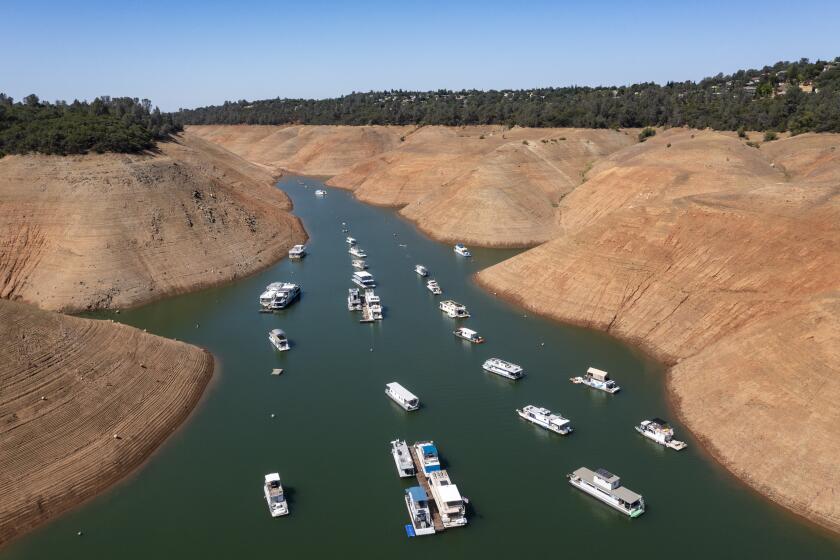‘A foundation of racism’: California’s antiquated water rights system faces new scrutiny
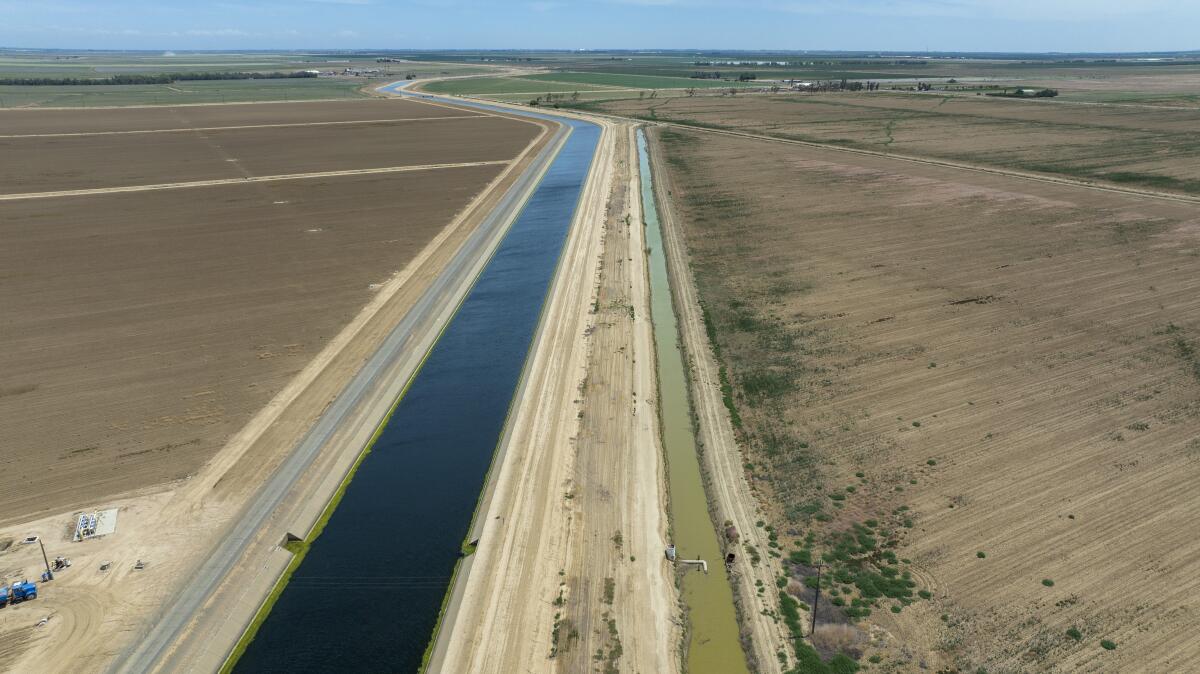
- Share via
It’s an arcane system of water law that dates back to the birth of California — an era when 49ers used sluice boxes and water cannons to scour gold from Sierra Nevada foothills and when the state government promoted the extermination of Native people to make way for white settlers.
Today, this antiquated system of water rights still governs the use of the state’s supplies, but it is now drawing scrutiny like never before.
In the face of global warming and worsening cycles of drought, a growing number of water experts, lawmakers, environmental groups and tribes say the time has finally come for change. Some are pushing for a variety of reforms, while others are calling for the outright dismantling of California’s contentious water rights system.
Calls for reform were heightened recently when the environmental group Restore the Delta released an analysis that concluded that the people who make decisions about California’s water are overwhelmingly white and male.
“The whole water rights system sits on a foundation of racism and violence,” said Max Gomberg, a former State Water Resources Control Board staffer who has sharply criticized the Newsom administration and now works with the environmental group. “It needs to be abolished.”
Citing global warming, California Gov. Gavin Newsom has unveiled a new water strategy to conserve, capture, recycle and desalinate supplies.
The report was released as state lawmakers held a hearing on several reform proposals that would address longstanding problems within the water rights system.
“This is not an easy conversation, but I think it’s long overdue,” said Assemblymember Rebecca Bauer-Kahan (D-Orinda), who chairs the Water, Parks and Wildlife Committee.
Bauer-Kahan said there are many signs the existing system is “not functioning well and equitably,” including the “inability to halt illegal diversions.”
During the hearing, experts such as Richard Frank, a UC Davis law professor, argued for a “more nimble system,” while Ellen Hanak, director of water policy for the Public Policy Institute of California, said the changing climate is stressing the water rights system.
“We’re confronting 21st century climate change, drought and water supply problems with a 20th century system of California water infrastructure and a 19th century system of water rights, and that’s a problem,” said Frank, director of the California Environmental Law and Policy Center.
Hanak and other researchers urged the Legislature to clarify that the State Water Board has the authority to enforce and curtail all water rights, including the oldest “senior” water rights, called riparian rights and pre-1914 rights. They also called for enabling the board to respond more quickly to dry conditions by relaxing requirements that limit when the agency can curtail diversions from rivers and streams.
The researchers recommended renegotiating senior water users’ contracts for supplies from the Central Valley Project and the State Water Project, California’s two main systems that transport water from the Sacramento-San Joaquin River Delta. They said the current contracts promise larger water deliveries than the delta can support in dry years.
Felicia Marcus, a researcher at Stanford University and former chair of the State Water Board, warned that “the crises ahead will make our crises today look like a picnic. So we need to invest in a system that will work for everyone.”
For example, she noted, senior water rights holders do not have to obtain a permit and do not pay any fees to administer the system, while others with more junior rights are required to do both. She said enforcement is complex and unwieldy, and the state needs a system that is “more transparent and implementable.”
Bauer-Kahan has introduced a bill that she says would help the State Water Board effectively enforce water rights and curb illegal water diversions. The legislation, AB 460, would authorize the board to issue larger fines of up to $10,000 per day for violations, plus additional amounts for water illegally diverted.
Other recently introduced bills would expand the State Water Board’s enforcement authority or its authority to investigate whether water is being legally diverted under a valid right.
Tribes and environmentalists are demanding California revise a key water plan, saying the Delta’s ecological crisis is tied to the history of racism.
Environmental advocates and tribal leaders have supported the proposals but are also calling for deeper changes, citing entrenched inequities.
Recently, two Department of Water Resources employees used software that analyzes people’s surnames in an attempt to determine their race and applied it to state water records in an analysis titled “Who makes decisions about California’s water?”
They analyzed the names of about 1,500 directors of local water agencies, and estimated — for those whose names could be classified — that approximately 86% were white and 78% were male. They found lack of diversity was especially pronounced for agricultural water districts, estimating that 92% of the directors are white and 92% are male.
They also analyzed state water rights data. Although the rights to much of the state’s water are controlled by institutions, such as agricultural irrigation districts and urban water districts, an estimated 1% to 2% of water diversions are listed under the names of individuals. Of nearly 14,000 water rights holders, an estimated 91% are probably white, they said.
They posted the analysis and data online on a state server, and the information was circulated on LinkedIn. The Department of Water Resources later removed the data.
Margaret Mohr, a DWR spokesperson, said the department removed the demographic data on water rights and local water agencies “because it was analyzed using predictive racial and gender modeling that can misidentify people and the data included a collection of personal information that should not have been posted publicly in that manner.”
“DWR is working to develop and determine a more appropriate method of collecting and reporting equity data as part of the 2023 update to the California Water Plan,” Mohr said in an email.
A coalition of California tribes and environmental groups is calling for U.S. Environmental Protection Agency oversight of the state water board.
Barbara Barrigan-Parrilla, executive director of Restore the Delta, said the agency’s decision to suppress the analysis was alarming.
“California water rights were created by taking away land and water from tribes. And as the water rights system developed, you had a parallel set of laws, customs and practices in California that redlined people of color out of land ownership near water,” Barrigan-Parrilla said. “It is just a continuation of the discriminatory practices that began in the creation of a system that was racist, and now it’s institutionalized discrimination that continues.”
During the 1800s, as white settlers staked their water claims, they sometimes simply nailed a notice to a tree. California still recognizes water rights based on those old claims, as well as riparian rights based on land ownership next to rivers and streams. Rights to surface water under the state’s prior-appropriation system follow a “first-in-time, first-in-right” order. And rights since 1914 fall under a state permit process.
Groundwater remained unregulated until 2014, when the state passed the Sustainable Groundwater Management Act, which is intended to combat widespread problems of overpumping.
Restore the Delta is part of a coalition of tribes and environmental groups that in December filed a federal civil rights complaint against the State Water Board, alleging discriminatory water management practices. They have called for overhauling the rights system, pointing to a legacy of racism that long prevented tribes and people of color from securing water rights.
Malissa Tayaba, vice chair of the Shingle Springs Band of Miwok Indians, said the findings of the data analysis reflect California’s history of removing tribes from their homelands through colonization and state-supported genocide.
Tayaba said that although the current water rights system “excluded us and continues to do so to this day, we know that tribes have inherent and sovereign water rights that we will continue to fight for.”
‘We are in a time of crisis’: Experts launch effort to update California water laws in the face of climate change and historic injustices
During last week’s legislative hearing, some argued that reexamining the system must address the effects of systemic racism.
“The system is deeply flawed in addressing equity. We need to examine the degree to which water rights are linked with wealth, power and privilege,” said Elizabeth Salomone, manager of the Russian River Flood Control and Water Conservation Improvement District.
Others discussed the difficulty of enforcing rules under such an antiquated system.
Last summer, one agricultural irrigation district defied drought regulations and drained water from the Shasta River, violating flow requirements intended to protect salmon. The State Water Board fined the Shasta River Water Assn. the maximum amount for the violation: $4,000.
“The maximum total penalty that the state board could impose for these violations, these intentional violations of their curtailment regulations, was clearly not a deterrent,” said Yvonne West, director of the board’s office of enforcement. “It demonstrated a lot of the enforcement challenges that we face.”
The illegal taking of water from the Shasta River was devastating for struggling fish species in the Klamath River and its tributaries, where ash-filled runoff from the McKinney fire had just recently killed tens of thousands of fish, said Arron “Troy” Hockaday, a Karuk Tribe council member.
“I cried. I’m so emotional right now,” Hockaday said. “Seeing what they did is devastating. It’s our future. It’s our future for our children, our culture, our way of life.”
He said the Karuk Tribe supports the measures to strengthen enforcement in Bauer-Kahan’s bill.
“We’re not against the farmers,” Hockaday said. “But at the same time, the fish are the senior right holders of the water. Remember that. Not humans. The fish are the senior right holders.”
